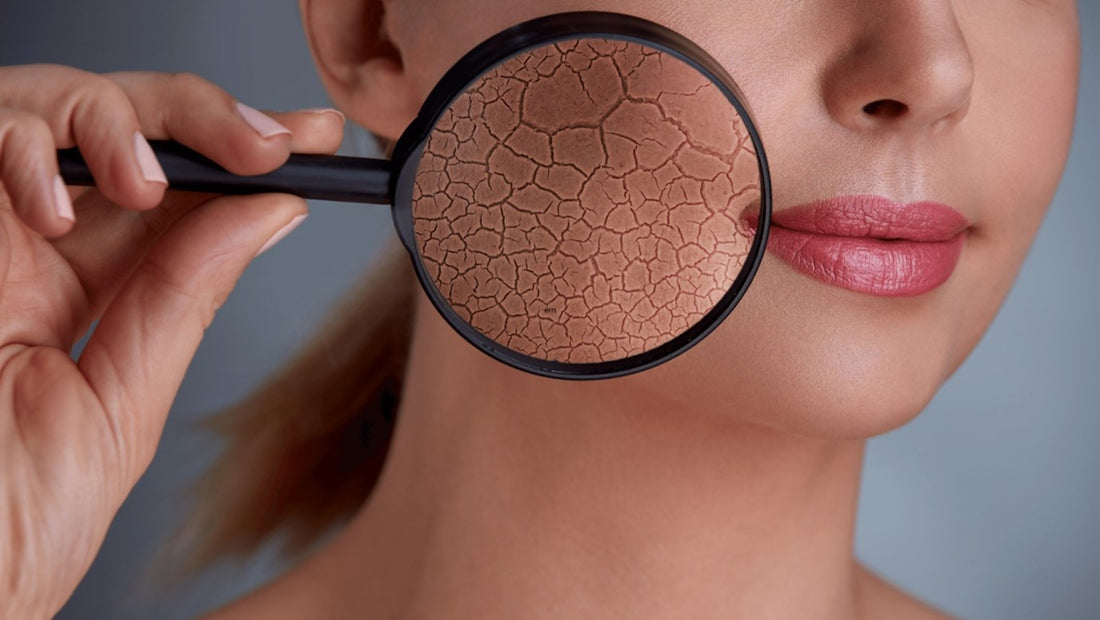
6 Different Skin Types and How to Identify Them
Share
Did you know that each skin type can react differently to the products you use? That is because when it comes to the ingredients in those products, it is not a “one size fits all” for skin. It is essential to know your unique skin type before you establish your skincare routine.
There are six basic skin types known as normal, oily, dry, combination, mature and sensitive. Each type of skin will have its own characteristics and require different care. The type of skin is determined by genetics, although it will also be affected by other factors and can change with time.
Let’s look at how to determine your skin type.
What is Normal Skin?
Normal skin is neither too oily nor too dry, with a regular texture. It has balanced sebum production and good blood circulation. Normal skin is also called eudermic. The Greek prefix eu- means "good," and -dermic is from the Greek word for "skin." This means it is well-balanced.
What are normal skin characteristics?
- Smooth, soft texture
- Fine pores
- No sensitivity
- No blemishes
- Few or no breakouts
- Good blood circulation
What is Oily Skin?
Oily skin is characterised by a greasy or shiny appearance. This skin type is prone to acne breakouts frequent in adolescents and young people under 30 years old. Oily skin is the result of excess sebum production due to open or large pores.
What causes oily skin?
- Hormonal Changes and imbalances like pregnancy or during puberty.
- The Climate, depending on the time of year and where you live.
- Genetics from your immediate family.
- Medication
- Stress
- Comedogenic cosmetics (make-up products that cause irritation)
What is Dry Skin?
Dry skin is determined by flaky and rough texture. It can at times feel tight, uneven, and cause irritation such as itching. While for most dry skin can be temporary, for some people it may occur more often and even be a lifelong condition. Dry skin can crack leaving it more exposed to bacteria, although in general, this is not serious, it may cause other skin disorders, for example, eczema, or be more prone to infections if not properly cared for.
What causes dry skin?
- Genetics from your immediate family including health status.
- Season changes in the weather.
- Long, hot showers can strip your skin of its essential oils/
- As you get older your sebum production reduces resulting in flaky skin.
What is Combination Skin?
Combination skin is a mix of oily skin and dry skin. Usually, the T-zone is oily, and the cheeks are dry. Breakouts tend to form only on the forehead, chin, and nose whereas your cheeks can be quite sensitive.
What Causes Combination Skin?
- If any of your parents or family members have combination skin, you may have it too.
- Harsh products used on the skin
- You may see a change in your skin type depending on the change in the climate or weather. For example, summers may make your skin oily. Your skin may feel dry during the winter months.
What is Sensitive Skin?
Sensitive skin is more prone to react to stimuli to which normal skin has no reaction. It is fragile skin, usually accompanied by feelings of discomfort, and can adversely react to new products.
What are the characteristics of sensitive skin?
- Skin feels itchy and tight
- Parts of your body have uneven texture
- Becomes oily in summer
- Can be dry in winter
- Reacts to skincare products
- Becomes red after a hot water bath
- Feels itchy while wearing tight clothes
- Flushes easily after eating spicy food
What is Mature skin?
People automatically assume that you have mature skin because of your age, but that is not necessarily true. Those over the age of 35 years old will start to show signs of mature skin but it is mostly determined by your lifestyle. These traits include stress, illness, smoking, sun damage, medication, lack of sleep and diet.
What are the characteristics of mature skin?
- Drier skin
- Thin skin
- Lack of firmness
- Deep set wrinkles
- Dehydration
- Loss of luminosity
- Lack of tone
- Open pores
- Hyperpigmentation and age spots
Looking after your skin
No matter what your skin type is, it's important to follow these skincare tips to keep your skin looking healthy:
- Use a broad-spectrum sunscreen daily, even when it's cloudy, to protect your skin from UVA and UVB rays
- Avoid direct sunlight during peak hours of 11am-3pm, and wear protective clothing like a hat and sunglasses
- Moisturise your skin daily
- Wash your skin gently and remove make-up before bed
- Stay hydrated by drinking plenty of water
- Don't smoke and avoid alcohol
Remember, skin can change over time, and taking steps to best identify your skin type will in turn be essential for it to function and look its best.
By keeping the health of your skin in mind and “checking in” regularly to determine whether any adjustments to your current ritual are needed will keep it balanced and beautiful. Visit our Freedom Cosmetics skincare range designed specifically for each skin type.